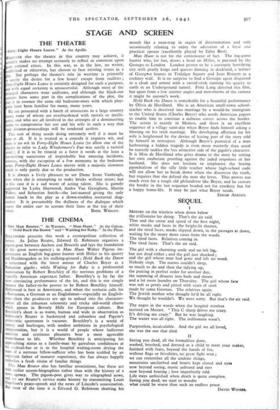THE CINEMA
This Man Reuter." At Warners. " Man Hunt." At the Odeon. Hold Back the Dawn " and" Waiting for Baby." At the Plaza.
HOLLYWOOD presents this week a cosmopolitan collection of heroes. As Julius Reuter, Edward G. Robinson organises a pigeon-post between Aachen and Brussels and lays the foundation of the great news-agency ; in Man Hunt Walter Pigeon im- personates an English big-game hunter with Hitler as his quarry and Berchtesgaden as his stalking-ground ; Hold Back the Dawn is concerned with the latest amour of Charles Boyer as a Rumanian gigolo ; while Waiting for Baby is a professorial examination by Robert Benchley of the nervous problems of a typically American expectant father. Benchley's is by far the most convincing performance of the lot, and this is not simple because the father-th-be proves to be Robert Benchley himself. Hollywood is best at Americans, and when the scenario calls for a Rumanian, a German or an Englishman—especially an English- man—then the producers are apt to unload into the character- isation all the inhuman solemnity . and tricky old-world charm which passes in Beverly Hills for European culture. But Benchley's short is as warm, human and wide in observation as Robinson's Reuter is hackneyed and colourless and Pigeon's aristocratic sportsman is vacuous. Benchley's is a world of fantasy and burlesque, with modest ambitions in psychological interpretation, but it is a world of people whose ludicrous anxieties and cretinous pleasures bear a most agreeable resemblance to life. Whether Benchley is anticipating his approaching status as a family-man by garrulous confidences at the cocktail-bar or is in the hospital waiting-room drying the tears of a nervous fellow-sufferer who has been scolded by an expectant father of maturer experience, the fun always happily embodies a fresh vision of familar things.
This Man Reuter also has familiar associations, but these are With earlier screen-biographies rather than with the history of a news agency. The pigeon-post gives way to telegraphed news, and we see Reuter's service make history by transmitting Louis Napoleon's peace-speech and the news of Lincoln's assassination. But most of the time it is Edward G. Robinson shutting his
mouth like a man-trap in orgies of determination and only occasionally relaxing to enjoy the adoration of a loyal and practical spouse (excellently played by Edna Best).
Man Hunt is not for the connoisseur of fact. The big-game hunter who, for fun, draws a bead on Hitler, is pursued by the Gestapo to London. London proves to be a curiously horrifying city with pearly kings and queens dancing in dockland, a terrace of• Georg•n houses in Trafalgar Square and Joan Bennett as a cockney waif. It is no surprise to find a Gestapo agent disguised in a cloak and armed with a sword-stick running his quarry to earth in an Underground tunnel. Fritz Lang directed this film, but apart from a few sinister angles and movements of the camera it might be anyone's work. Hold Back the Dawn is remarkable for a beautiful performance by Olivia de Havilland. She is an American small-town school- teacher who is deceived into marriage by a would-be immigrant to the United States (Charles Boyer) who needs American papers to enable him to continue a dubious career across the border. The action is mainly in Mexico, and there is an excellent sequence of a village saint-day when Boyer finds himself asking a blessing on his trick marriage. His developing affection for his wife is heightened by the device of having part of the story told by himself in retrospect. Although Boyer's portrayal of a man harbouring a hidden tragedy is even more masterly than usual he scarcely tackles the less attractive side of the gigolo's character. It is Miss de Havilland who gives drama to the story by setting her own exuberant prattling against the jaded responses of her husband. She does not hesitate to emphasise the boring parochialism of the silly little teacher whose high-school code will not allow her to break down when she discovers the truth, but requires that she defend the man she loves. This proves too much even for a tough old philanderer like Boyer, and he crosses the border in the last sequence headed not for crookery but for a happy home-life. It may be just what Boyer needs.
EDGAR ANSTEY.


























 Previous page
Previous page